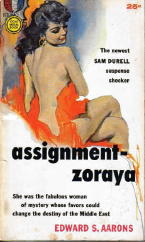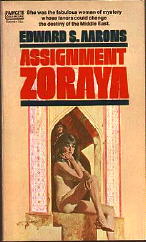Wed 3 Dec 2008
Archived Mystery.File Review: EDWARD S. AARONS – Assignment: Zoraya.
Posted by Steve under Authors , Reviews[2] Comments
EDWARD S. AARONS – Assignment: Zoraya.
Gold Medal #979. Paperback original; first printing, March 1960. Reprint editions include Gold Medal T2616, 1972, with a new cover (shown).

Now this. Not putting down any of the other books reviewed this issue, this is the real thing. The eleventh of CIA agent Sam Durell’s violent around-the-world adventures, it possesses a drive and story-telling intensity unmatched by very few writers today.
I have mentioned before that I don’t read spy thrillers at all any more, but that wasn’t really true. I don’t read today’s bloated novels of Nazi hunts or nuclear conspiracies, and I seldom read convoluted LeCarrean tales of cold war intrigue, but I do read Edward S. Aarons.
One wonders if Aarons ever travelled to all the places he describes so well. This story takes Durell from sunny Geneva to the picturesque Mediterranean island of Elba to the hot burning deserts surrounding the small Arabian port city of Jidrat, and in each place we get the unmistakable feeling that we are actually there. One suspects it is because Aarons also had a sense of history as well.
Durell’s mission in this book: to return decadent Prince Amr al-Maari to his homeland, in a last-ditch attempt to provide leadership to a country about to undergo a bloody revolution. Zoraya is his wife, married when she was but eight years old, but repudiated ever since by Amr, she has spent her life simply waiting for him. If anyone can assist Durell in forcing the Prince out of his present life of drunken debauchery, it is she.

Coincidence is very much a part of every good writer’s stock-in-trade, but unlike the whopping one leading off Nick O’Donohoe’s book [reviewed here not so long ago], only one of Aarons’ characters — the Jewish-Hungarian wife of Major Kolia Mikelnikov, Durell’s Russian counterpart — comes on the scene solely by accident, and even that is made plausible.
When the stage is set, the drama that then plays itself out on the blood-splattered streets of Jidrat and the besieged palace of Amr’s grandfather is clearly not fun and games.
Here’s a description of Sam Durell that sums him up pretty well (page 130): “…you do things in the name of duty which you really do not have to do.”
[UPDATE] 12-03-08. Nope, I don’t remember this one either. I could easily read it again, after reading what I had to say, but I haven’t yet read all of the other Sam Durell adventures, so I probably won’t. Not right away, anyway.
I wonder why I was so down on John Le Carré at the time. I still don’t read bloated novels of Nazi hunts or nuclear conspiracies, but I while I haven’t recently, I have no aversion to reading anything by the man who wrote The Spy Who Came in from the Cold. That’s a book I definitely do remember, and I read it when it first came out.
February 11th, 2009 at 1:14 am
Aarons is another underappreciated writer who wrote clean uncluttered prose and knew his way around plot and character. The best of the Durrell books are superior examples of their field and still hold up today even if the politics have left them behind.
I do have a question, though likely no one can answer it. The familiar portrait of Durrell featured originally on the front covers and later on the back looked nothing at all like the lean black haired black eyed character known as the “Cajun” who I always pictured as a cross between Dale Robertson and Zachary Scott. Gold Medal’s other series icons all looked a good deal like the characters within — Matt Helm, Joe Gall, Shell Scott, Travis McGee, Chester Drum, even Earl Drake the “man with no face” — but Aaron’s “Cajun” was this blonde pale eyed guy in a fedora, and as late as 1962’s Assignment Karachi Durrell is portrayed on the cover as a blonde. I think the original portrait is by Bayre Phillips who did most of the early Aarons covers and Karachi looks like it might be the work of Harry Bennett. You would think in all the years the series ran and considering it always had steady sales that someone would have noticed the cover portrait was nothing like the character described in the book. Anyone know what was going on?
February 15th, 2009 at 9:50 pm
[…] Posted by Steve under Covers , Characters , Inquiries — Following my review of Assignment Zoraya, by Edward S. Aarons, David Vineyard recently left this […]